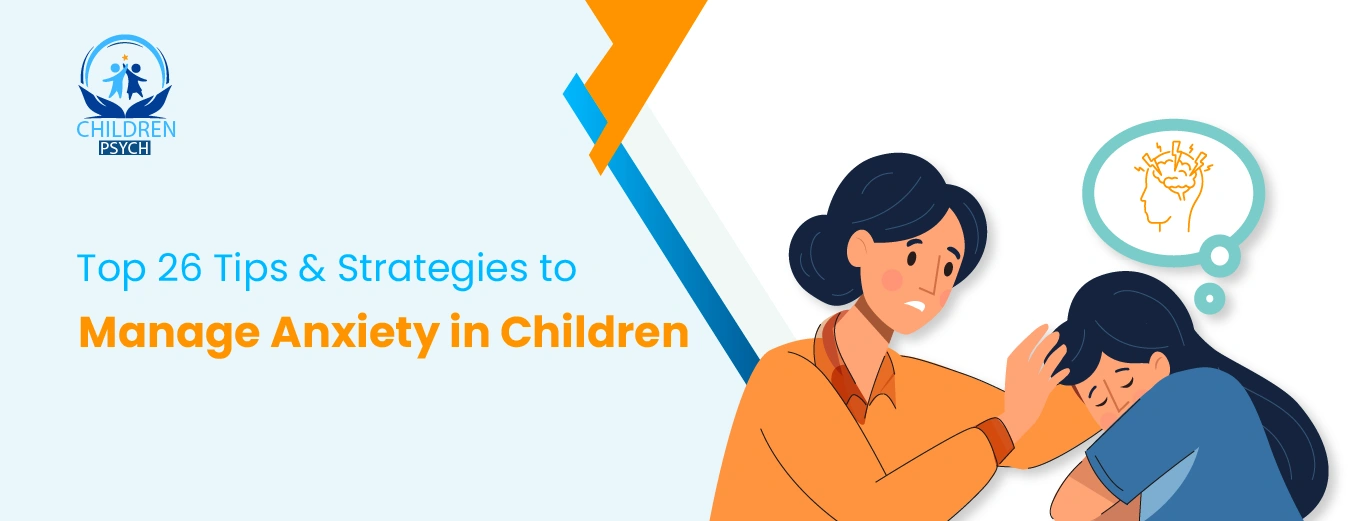‘’Developing and maintaining a healthy routine, managing stress and fear, positive habits, practising stress management and mindfulness techniques, and acknowledging negative thoughts can help the children in managing anxiety and living a stress-free, peaceful life’’.
Anxiety is an emotion or feeling of fear, worry, and uneasiness. It’s quite common and normal to feel anxiety, but if it persists and interferes with daily life functioning, then it is something that should be immediately considered. Children and adolescents are more exposed to external stress factors and therefore suffer more from anxiety. But the right strategies can help them overcome their stress or anxiety.
This article gives a detailed insight into the ‘’ Top 26 Tips & Strategies to Manage Anxiety in Children. There is an extensive list of tips or strategies, but among them, the most common and useful ones include fear management, healthy lifestyle, adopting positive habits, meditation, limiting screen time, role-play, and acknowledging emotions etc. So read now!
Top 26 tips or strategies that help your child manage anxiety
An anxious child can not exactly tell what he or she is feeling and why they are showing negative behavior. So, as a parent or caretaker, it’s your responsibility to identify their symptoms of anxiety, which include
- Elevated heart rate
- Shortness of breath
- Sweating or shaking of hands
- Difficulty in focus or attention
- Gastrointestinal issues
- Feeling cold or hot
The following are the main ways that parents or caregivers can employ to overcome anxiety in children.
1.Teach your child to manage fears
The first thing as a parent that you should try is to calm your child. When you realize that your child is not anxious and mentally relaxed, start a conversation with your child. Ask your child which things are triggering their anxiety or what is their main source of fear. As soon as you identify the main causes or trigger factors, teach your child different ways to manage or overcome their fear. For example, you can ask them to practice:
- Stress management and deep breathing techniques
- Positive self-talk to raise confidence and deal with stress or anxiety
- Gradual exposure to fear stimuli to develop resistance
In addition, you can also ask your child to think about a place or person that makes them calm. For example, if they feel comfortable with any friend, then make with them so they feel relaxed. a call
2. Give them rewards
Children love surprises. If your child is not happy and is taking stress, then you can give them rewards. Ask them to participate in any activity or complete the provided tasks. After that, start praising them and turn on their happiness by giving them some amazing rewards or gifts.
3. Develop a healthy lifestyle
Always remember that a positive and healthy mindset is based on sound physical health. Therefore, help your child in developing a healthy and positive lifestyle, which includes:
Nutritious diet: A healthy body has a healthy mind. Make sure that your child is taking nutritious food in each meal, which includes proteins, carbs, and some essential nutrients.
Balanced sleep-wake cycle: If children are not getting good quality sleep, then they can not perform well in any activity. They can not pay attention in their classroom due to sleep issues. However, if their sleep pattern is balanced then then they remain energetic throughout the day and always give their best in both academic and personal life.
Multiple studies have reported that every school-going child needs approximately 9 to 12 hours of sleep to stay mentally strong and active. However, teens require about 8 to 12 hours of sleep.
Physical activity: Ask your child to go outside and spend some time in any physical activity, such as jogging, running, playing, or any sport with friends.
4.Positive and healthy habits
A child with healthy and positive lifestyle habits can easily deal with stress and anxiety and improve their mood as compared to those children who have bad habits.
5.Meditation
Children dealing with anxiety can restore their state of mental calmness by practising meditation. It revolves around mindfulness techniques that allow the person to stay calm while staying in the present moment. The following are the major types of meditation that help manage anxiety:
- Mindful breathing
- Guided meditation
- Classroom meditation
- Mantra meditation
- Bedtime meditation
Furthermore, there are also different apps available that provide guidance regarding meditation. You just have to search ‘’meditation for kids’’ on search engines to find the related plans or guidance regarding meditation.
6.Avoid reinforcing the child’s fears
Never say any words or sentences that induce fear in a child. If you say that you should be afraid of this situation or that this place is scary and you should be afraid of then there are higher chances that your child will start experiencing the fear even in normal situations.
So you should use the following sentences, such as ‘’ You should be brave enough to deal with this situation’’ and ‘’This is not scary at all.
7.Avoid asking leading questions
As a parent, your main goal is to calm your child instead of making them more anxious. Support them and encourage them to share their feelings, but do not ask any leading questions from them, such as:
- Are you feeling stressed about this upcoming big project?
- Are you anxious about the science exhibition?
These questions can boost their anxiety cycle, so you have to avoid them. Instead of this, try to ask open-ended questions like ‘’ What are you feeling about this competition and share your thoughts with me’’.
8.Counting
Counting numbers quickly is another proven way to manage stressful thoughts. Teach your child this counting strategy whenever they feel stressed.
Ask them to put their head down, close their eyes, and start counting from 1 to 100, 2 to 100, and then 100 to 200 until they feel their mind distracted and relaxed. Likewise, you can also ask them to start repeating the tables in your head. By doing this, they can get relaxation from their thoughts that make them anxious.
9.Role play
Children always learn from their parents. If your child is not confident enough to deal with any challenging or new situation, then you can role-play that situation to help them get prepared. For example, if they have difficulty talking to any new person, then you can start the conversation first. Likewise, if they are feeling hesitant about asking for notes from their friends, then you can ask them and also invite them to break the communication barrier between them.
Furthermore, some other small steps which can also raise their self-confidence and self-esteem include:
- Giving an order in a restaurant
- Talking with the teacher
- Buying a ticket for the cinema
10.Avoid labeling the emotions.
Teach your child that there is no need to label their emotions. Just guide them that emotions are of two types: good and bad, and they just have to learn to manage them according to each situation. Moreover, never say to them that ‘’ You should feel bad as you failed this exam. Instead of this, say to them that’’ It’s ok that you don’t get the good marks. Don’t feel bad, work hard to achieve success next time.
11.Acknowledge their negative thoughts.
Encourage your child to accept their thoughts and fears. Teach them that taking stress is quite normal. However, if their stress persists and interferes with their normal life functioning, then it should be considered. Train them to face their fears and negative thoughts. Instead of feeling overwhelmed with negative, undesired, or intrusive thoughts, ask yourself to avoid them and replace them with positive thoughts.

12.Validate their emotions
Those things that seem smaller might be bigger in front of your child. Therefore, whatever your child feels, you have to validate their feelings, emotions, and thoughts. Develop a secure, non-judgmental, and friendly environment where your child feels listened to and heard and can speak their heart out. Show your love, support, and empathetic behavior to your children. So they become strong enough to effortlessly navigate every challenging situation in life.
13.Teach them social skills
If you think that your child is having trouble in social interactions, then you can teach them multiple social skills so they can easily participate in each social activity without any fear of judgment or criticism. Moreover, you can also engage them in different challenging situations to increase their confidence, so they always feel comfortable in each social interaction.
14.Talk to your child’s teacher
If your child’s academic performance is not good and also shows negative behavior, then you can also set up a discussion with your child’s teacher or caretaker and find the main reason for your child’s poor performance in school and unwanted behavior.
15.Limit their screen time
Excessive screen time or the presence of a child in front of the screen can also induce stress and anxiety. Never allow them to waste their time playing games or watching their favourite series. However, set a specific screen time for them so they manage their time and also invest their precious time in healthy or productive activities.
16.Set a family time
The time that you spend with your child matters a lot. Get some free time, sit with your children, and discuss everything that they do in their daily life routine. In this way, your child will not only feel understood but also learn multiple things from your positive conversation. So you should make sure that you always discuss positive topics with them.
17.Fidget toys
Fidget toys are usually small toys that divert the attention of children away from anxiety. Most popular fidget or tactile toys include spinners, stress balls, putty, and fidgetcube, etc.
With the help of these toys, children can improve their focus and attention and get rid of their worrisome thoughts in a very playful manner.
18.Do not minimize anxiety.
Your child should learn that taking l’ll bit of stress is ok if they are not feeling any energy and passion to do their vital activities. Teach them that they should not suppress their anxiety. Extract their inner potential so they excel in each phase of life by eradicating their anxiety.
19.Journaling
Journaling is also the best way to reduce stress and anxiety. Teach your child to start journaling regularly. Set a specific time on each day and write their feelings and thoughts on paper without any fear of criticism. Moreover, tell them to do journaling, especially when they feel fear. By doing this, they can focus on their thought patterns, identify their triggers, and learn to develop coping strategies accordingly.
20.Break down tasks
Children usually get frustrated easily after getting stuck in any complex situation, but you can help them deal with the issue. For example, you can help them in breaking down the complex tasks into smaller ones so they never feel overwhelmed. You can assist them in starting a new project or completing any ongoing complex one.
21.Anchoring phrases
Anchoring phrases are powerful sentences that help children strengthen their minds and diminish their anxious or distressing thoughts. Sit with your child and make some sentences that your child can repeat with you to stay confident and mentally strong. For example:
- ‘’ I am strong and powerful’’
- I can navigate all the life challenges
22.Art activities
Art activities are also useful for the children to get relief from anxiety. By engaging in different art activities, they creatively express their anxious thoughts. First, instruct your child to draw something on paper so they can express their anxiety better via art rather than simply using words.
Moreover, to identify their anxiety, you can assign the names of different emotions to colored pencils or crayons and then ask them to fill in the rainbows or any other picture that they drew on paper. This will help to identify their exact emotion. After that, you can also start a conversation on the topic of creativity and then make it easy for them to share their mental issues.
23.Setting realistic goals
If your child has tough goals and faces difficulty in achieving them, then they will feel stress and anxiety. Therefore, you should help your child in setting and achieving realistic goals. So when they feel that they are getting something that they wanted, then they will surely experience the lessened anxiety symptoms.
24.I Spy
I Spy is one of those useful games that help children inhibit their racing thoughts by using their five senses. In this game, parents ask the children to notice five things in their surroundings that they can easily see, touch, smell, and hear. They instruct them to use their five senses, so by doing this, they get distracted from anxiety at that moment and feel calm and relaxed.
25.Aware of their anxiety
Your child can battle with anxiety only in that case when they are completely aware of it. Therefore, teach them what anxiety is and how it can affect their life. Moreover, teach them useful ways to cope with their stress and anxiety.
26Be a role model for your child.
Always remember that children always mimic the behavior of their parents. So you should be careful while doing everything, as your children will learn from you. Therefore, always try to model healthy and useful ways of overcoming anxiety so your children can better know what they can do to cope with anxiety. For example, if you spend more time on phone usage, then your child will do the same. So, engage yourself in any healthy activity so your child follows your behavior and strengthens their mind to deal with every negative situation.
Get the Professional Anxiety treatment for your Child at Children Psych
At Children Psych, we are committed to helping your child obtain mental stability. We understand that your child or adolescent deserves the mental peace to thrive in each phase of life. With the goal of your child’s mental stability, we offer a diverse range of comprehensive psychiatric services for treating the common mental health issues, which include anxiety, depression, ADHD, OCD, and bipolar disorder.
Whatever your child’s mental issue, here at Children Psych, you can find tailored mental health treatment solutions for each child. Our expert child psychiatric nurse practitioners are well-versed in each aspect of mental health issues and treatment. They first evaluate the mental state and then develop a therapeutic strategy that suits the mental health requirements of each child.
So if you want to help
your child manage their mental health issues to live a prosperous life, then we are here to help.
Book an appointment with Child Psych’s experts to start a journey to your child’s better and improved emotional and psychological development.
Consult Now!
Frequently Asked Questions
How can you help your child who is dealing with anxiety at school?
Multiple ways can help your child manage anxiety, such as journaling, staying positive, acknowledging their thoughts, and adopting a healthy lifestyle.
When should you start worrying about your child's mental health?
When you feel that your child is dealing with anxiety and showing the following signs, you should consider your child’s mental health:Excessive mood alterations
Most often crying
Tantrums
Social isolation
Stomach issues
What is the 3-3-3 rule for anxiety?
This is a technique to get rid of anxiety as it involves seeing three things, listening to three sounds, and feeling the smell of three things in the close surroundings. This helps the individuals, including children, to immediately distract their minds from the continuous flow of worries.
What should be avoided with children suffering from anxiety?
Avoiding those things that you think can trigger your child's anxiety is not a wise decision. Instead of this, teach them useful ways to deal with them.
What is the anxiety scale for children?
The Pediatric Anxiety Rating Scale is used for the specific measurement of the severity or extent of anxiety symptoms in children aged 6 to 17 years.
What is the anxiety curve for kids?
An anxiety curve is a specialized curve in which you can see the increasing and decreasing frequency of anxiety disorders.





